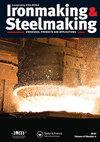冷却条件对Al-Ti脱氧钢中典型夹杂物尺寸演变的影响
IF 2.2
3区 材料科学
Q2 METALLURGY & METALLURGICAL ENGINEERING
引用次数: 0
摘要
摘要利用共聚焦激光扫描显微镜对不同冷却速率的Al-Ti脱氧钢进行了凝固实验。研究了冷却速度对钢中典型夹杂物Al2O3、TiS和Al2O3-TiS的形态和尺寸分布的影响。实验结果表明,冷却速度对夹杂物形态有显著影响。随着冷却速度的增加,夹杂物的数量小于3 当夹杂物数量大于3时,μm增加 μm继续下降。夹杂物的数量密度随着冷却速度的增加而逐渐增加。采用动力学和热力学相结合的方法计算了夹杂物的形核和生长。研究发现,冷却速度对夹杂物的析出温度没有影响,但对凝固过程中溶质元素的偏析影响较小。基于热力学计算,TiS夹杂物可以在凝固结束时沉淀,而Al2O3夹杂物可以在液相中沉淀。随着冷却速率的升高,夹杂物的尺寸逐渐减小,冷却速率对夹杂物的影响减小。本文章由计算机程序翻译,如有差异,请以英文原文为准。
Effect of cooling conditions on the size evolution of typical inclusions in the Al-Ti deoxidised steel
ABSTRACT Confocal laser scanning microscopy was used to perform experiments with various cooling rates for the solidification of Al-Ti deoxidised steel. The effects of cooling rate on the morphology, size distribution of observed with typical inclusions, Al2O3, TiS, and Al2O3-TiS in the steel were investigated. The experimental results demonstrate that the inclusion morphology is significantly influenced by the cooling rate. With an increase in cooling rate, the number of inclusions smaller than 3 μm rises while the number of inclusions bigger than 3 μm continues to fall. The number density of the inclusions increases gradually with the increase of the cooling rate. The nucleation and growth of inclusion were calculated using a combination of kinetics and thermodynamics. It was found that the cooling rate has no influence on the precipitation temperature of inclusions but has slightly influence on the segregation of solute elements during solidification. TiS inclusions can precipitate at the end of solidification while Al2O3 inclusions can precipitate in the liquid phase based on the thermodynamic calculations. As the cooling rate rises, the size of the inclusions decreases gradually and the effect of cooling rate on inclusion decreases.
求助全文
通过发布文献求助,成功后即可免费获取论文全文。
去求助
来源期刊

Ironmaking & Steelmaking
工程技术-冶金工程
CiteScore
3.70
自引率
9.50%
发文量
125
审稿时长
2.9 months
期刊介绍:
Ironmaking & Steelmaking: Processes, Products and Applications monitors international technological advances in the industry with a strong element of engineering and product related material. First class refereed papers from the international iron and steel community cover all stages of the process, from ironmaking and its attendant technologies, through casting and steelmaking, to rolling, forming and delivery of the product, including monitoring, quality assurance and environmental issues. The journal also carries research profiles, features on technological and industry developments and expert reviews on major conferences.
 求助内容:
求助内容: 应助结果提醒方式:
应助结果提醒方式:


